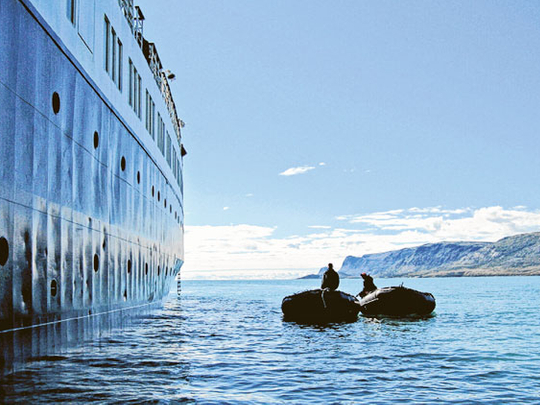
Washington: The Arctic could become the next great international battleground for resources, with melting icecaps opening new shipping routes, fishing grounds and, most significantly, some of the world's richest and as yet unexplored oil and gas deposits.
So far, the United States, Russia and other nations near the North Pole are trying to work together. They'll take a baby step in that direction this week by agreeing to the first international treaty covering the Arctic Ocean, a coordinated search-and-rescue pact that will grow in importance as more cargo and cruise ships start navigating the cold waters.
"We want to send a message in a post-Cold War world that the Arctic is a region of cooperation, not conflict," said Jim Steinberg, the deputy US secretary of state. The message will be a cautious one, however.
Tough questions
US Secretary of State Hillary Rodham Clinton and Interior Secretary Ken Salazar will sign the deal with their counterparts from seven other countries in Greenland today. But the biennial Arctic Council meeting will tiptoe around some tougher questions of cooperating on global warming as well as competing territorial claims and what to do in the event of a catastrophic oil spill.
Four years ago, Russia staked its claim to supremacy in the Arctic and to control as much as a quarter of the world's oil and gas reserves, planting a titanium flag on the ocean floor and arguing that an underwater ridge connected the country directly to the North Pole.
The United States does not recognise the Russian assertion and has its own claims, along with Denmark, Norway and Canada, while companies from ExxonMobil Corp. to Royal Dutch Shell want to get in on the action.
Washington, for its part, still has yet to ratify the United Nations 1982 Law of the Sea treaty regulating the ocean's use for military, transportation and mineral extraction purposes.
Speaking on Monday at the Centre for Strategic and International Studies in Washington, Steinberg acknowledged some differences between countries that wouldn't be resolved this week. "No country is going to be successful here trying to assert territorial control without working with others," he said.
Far-reaching changes
The council comprises the US, Russia, Canada, Norway, Sweden, Finland, Denmark and Iceland. It meets amid a flurry of reports outlining the far-reaching changes that are affecting 4 million people living in northerly frontiers from Alaska to Scandinavia to Siberia and those beyond.
Research points to ice melting faster than expected and global sea levels rising by up to five feet this century with soot from truck engines, aircraft emissions, forest fires and fossil fuel-burning stoves contributing to the thaw and possibly a 25 per cent jump in mercury emissions this decade. These would threaten polar bears, whales, seals and the mainly indigenous communities who hunt those animals for food.












